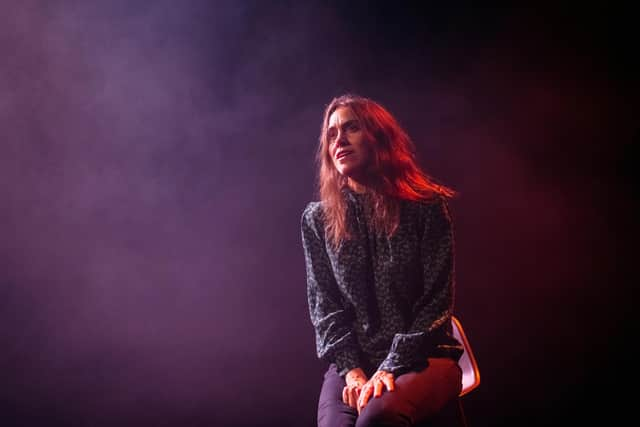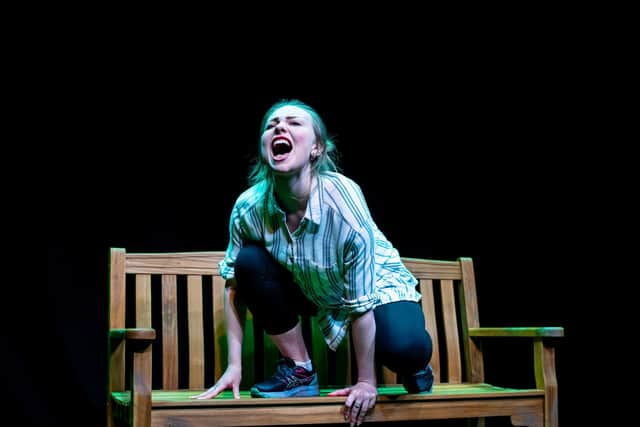Edinburgh Festival Fringe theatre round-up: She Wolf | Psychodrama | Guide To Surviving Masculinist Territory | ALOK
She Wolf ****
Assembly Roxy (Venue 139), until 28 August (not 15, 22)
Psychodrama ****


Traverse Theatre (Venue 15), until 28 August (not 15, 22)
Guide to Surviving Masculinist Territory ***
Summerhall (Venue 26), until 28 August (not 22)
Liz Lochead’s mighty version of Euripides’s Medea, playing at The Hub as part of the international festival, sends a cry of female rage from more than 2000 years ago echoing across this year’s Edinburgh festivals. But magnificent though she is, Medea is not alone: after #MeToo, the intensifying inequalities of lockdown, and the murder of Sarah Everard with all its consequences, this year’s Edinburgh Fringe is full of furious young women demanding change, or finally losing control of their rage. One of the first among them is the Scottish writer and performer Isla Cowan, whose solo play She Wolf is attracting packed crowds to the tiny basement in Assembly Roxy.


As Cowan’s story begins, her character Maggie is sitting by the wolf enclosure at Edinburgh Zoo, gazing at the only living creatures with whom she can still identify. The story she unfolds is one in which strands of class, gender and ideology intertwine to create a horrifying cocktail of rage and violence. Maggie is a woman of relatively humble background who – inspired by the example of a glamorous businesswoman aunt – has worked her way up to a significant position in a leading Edinburgh company, with the boyfriend and lifestyle to match
Advertisement
Hide AdHer tightly-controlled life plan begins to fall apart, though, when her boyfriend dumps her for a younger and posher woman, and she is passed over for a key promotion by a male candidate with the right connections. At first, Maggie only causes a scene in the office, and stalks her work rival in the street. But as she loses her job, and her life falls apart, she becomes ever more feral, ranging across the city to lash out at any man or woman who arouses her ever-simmering rage.
All of this is conveyed in vivid and unforgettable language in Cowan’s text, and delivered with unforgettable intensity in her own fierce and dazzling performance, directed to perfection by Joanna Bowman. In the end, watching the wolves, she begins to understand that there is more to their life than crude human theories of social Darwinism – “move fast, or fall behind” – might suggest. By then, though, it’s much too late for Maggie; and for the victims of a fury spawned by a society which, in Arthur Miller’s unforgettable words, encouraged her to pursue “the wrong dreams”.
Another very angry woman takes the stage alone in Matt Wilkinson’s acclaimed monologue Psychodrama (first seen in London in 2020) but here the style is more elegant and darkly humorous than furious. Emily Bruni (from Peep Show and a host of TV dramas) plays an actress in her 40s who works in a dress shop to fill the gaps between acting jobs. She is delighted to be asked to appear in a film responding to Alfred Hitchcock’s Psycho, which is being made in England by an international director of great renown.
Like all relatively unsuccessful actors of a certain age, though, Bruni’s character is in some ways a victim of abuse, full of suppressed rage at the directors – mainly male – who wield absolute power not only over whether she works or not, but also over what she is asked to do when working. When this director’s voyeuristic arrogance begins to get on her nerves, the story first fragments, and then takes a very dark turn.
Bruni conveys these subtle changes of tone in a performance with a quietly lethal quality that is both absorbing, and finally chilling; in a stripped-down production directed by Wilkinson himself that offers Bruni nothing to work with but the high stool she sits on, and the sheer vividness of the text, but nonetheless delivers an immensely well-crafted hour of theatre. It sends up the acting industry in fine style, but also makes wider points about how exploitation can only be endured for so long before something has to give.
In Guide To Surviving Masculinist Territory, presented by Swiss company Pintozor at Summerhall, one woman’s anger and despair at the rise of the incel movement – a worldwide network of unwillingly celibate and virulently misogynistic young men – is presented through the medium of a solo audio play, which the audience experiences via a headset while walking in a group around the streets and parks of south Edinburgh.
Advertisement
Hide AdThe audio drama tells the story of a young woman who, feeling increasingly unsafe on the streets of her city, becomes fascinated by the online presence of one particular incel, and by his journey towards an act of savage violence on the streets of his own city. The script, written by Marion Thomas and performed in Edinburgh by Rosalind McAndrew, is absorbing, thoughtful and sometimes terrifying.
To experience it while walking with a crowd of other audience members, though, is to miss the deepest anxiety of being a young woman alone on city streets; not least the terror of knowing that in a world that combines widespread social breakdown with unlimited access to online porn, there are now global communities of young men who not only hate you, but are actively inciting one another both to remove your hard-won rights, and – if they feel like it – to deprive you of life itself. Joyce McMillan
ALOK ****
Traverse Theatre (Venue 15), until 21 August (not 15)
Advertisement
Hide Ad“There’s a real crisis facing this country,” deadpans Alok Vaid-Menon near the start of this brilliantly blistering hour. “It’s not trans women in toilets. It’s straight men in comedy.” Alok is one of the US’s foremost creative practitioners engaged with trans and non-binary visibility and rights, and has a worldwide following. Their work moves across art, writing, fashion and, here, comedy, in the form of a set that meets the transphobic nonsense of some mainstream stand-up on its home turf and nimbly eviscerates it.
The likes of Ricky Gervais and Dave Chappelle are never named. Rather, Alok embarks on an extended inversion of conventional stereotypes, offering instead the ironic fruits of a sustained ethnographic exploration of straight white people. This tongue-in-cheek yet nuanced survey ranges from what their Instagram feeds might teach us about “the intersection of love and light” to the proposed understanding of heterosexual monogamy as “a masochistic endurance performance piece”. Along the way there are pithy takes on nation, biology, home decor, being the only person of Indian descent in the yoga class and the poor calibre of transphobic public abuse in Los Angeles.
High-stakes issues are served with a light touch (and a stunning ensemble of gold, orange and fuchsia). Alok’s precise delivery mostly comes as a lullaby drawl, punctuated by occasional growls or yelps. But there are also swerves into evocative performance poetry about darker subjects – not familiar cliches of trans suffering but personal experiences of grief and chronic pain. These are deftly, even vertiginously woven into the fabric of the comedy set, which builds to a devastating, defiant crescendo. At a time when mainstream transphobia has become, in Alok’s phrase, “less of a dog whistle than a Rottweiler” with its teeth sunk in, this show demonstrates the potent combination of humour and resistance. Ben Walters